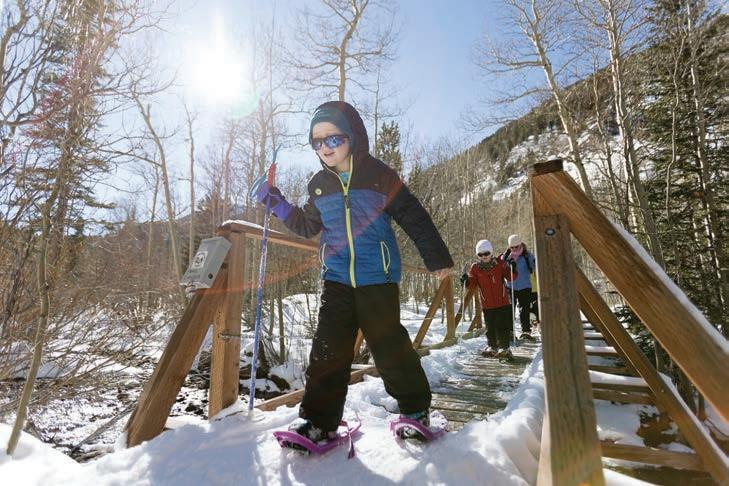
13 minute read
Thomas opposes water board formation, process
BY ELLIS ARNOLD EARNOLD@COLORADOCOMMUNITYMEDIA.COM
With Douglas County’s population expected to keep growing — and many homes relying on a limited supply of water from underground aquifers — the question of how to shore up water supply in the county hangs over the area’s water providers.
Now, the county government wants to get more involved in addressing that question. But one of the county’s three elected leaders doesn’t support going down that path.

However, with two voices outweighing the dissenter, the county has put out a call for Douglas County residents to apply to serve on a new entity called the county Water Commission. at body is expected to create a plan regarding water supply and conservation, among other aspects of water in the county.
When Commissioner Abe Laydon voiced support for creating a water commission, his colleague, George Teal, agreed.
“ e people of Douglas County do care about water resources, and they want their county commissioners involved,” Teal told Colo- rado Community Media.
Commissioner Lora omas opposes forming a water commission, calling it “totally unnecessary, a waste of time and e ort and money.” e forming of the new body comes against the backdrop of a controversial proposal to pump about 22,000 acre-feet of water per year to Douglas County from the San Luis Valley, a region of Southern Colorado. (An acre-foot is the equivalent of a one-foot-deep pool about the size of a football eld.)
“You don’t do a water commission that’s going to be no cost,” omas said.
Renewable Water Resources is the private company that proposed the project.


Last year, Laydon joined omas in deciding not to move forward with that project while Teal continues to support it.
“Everything’s on the table as far as I’m concerned,” Teal said in early August. “We get another ve or six years of rainy summers, OK, maybe then we can start to be picky and choosy.”
Still opposing the Renewable Water Resources project, omas expressed concern that the county’s formation of a water commission is “another swing at that ball.”

Asked whether any representatives of RWR have spoken with county o cials about the water commission, Teal said: “I think I did see that Sean Tonner, he’s one of the principals of RWR … has put in an application to be on the water commission.”
Teal said he has been friends with Tonner for 20 years.
“We are very likely to drink beer together and have a social visit. He may bring it up,” Teal said. “But otherwise, that hasn’t happened yet.” convicted at trial when the jury returned the verdict of vehicular homicide, vehicle assault and a child abuse charge as the defendant’s child was in the back seat when the incident took place and she ed the scene. e Douglas County Sheri ’s Ofce has a separate tra c unit that requires additional training and when Weekly became sheri , he increased the number of tra c o cers.
Teal said he hasn’t seen the application itself.
Another case involving vehicular homicide is People v. Ricky AvalosTrujillo.
Last year, four teenagers from Castle View High School were struck head on by Avalos-Trujilo. Two of the students were killed and two sustained serious injuries.
Avalos-Trujilo has been sentenced to 31 years for multiple counts of vehicular homicide, vehicular assault and careless driving.
Weekly said the department takes tra c enforcement very seriously.
Currently, Douglas County’s DUI arrests are up 59% this year from the previous year, said Weekly. “ at’s good and bad,” said Weekly. “Good because we’re catching these folks but bad because our DUI arrests are up and people are still drinking and driving.”
Another high pro le case in the county is the People v. Casey Devol.
Devol has pleaded guilty to killing his sister and her boyfriend last year.
Weekly said it’s important for the community to know whenever there is a homicide case, detectives are working around the clock with the victim in mind.
“You only get one chance to do it right the rst time,” said Weekly. “So we are very thorough and methodical in what we do.”
Transparency in numbers e 18th Judicial District has a data dashboard available to the public to look at trends in cases led and resolved over time. e county currently has zero failure to appear in court, said Kellner. Just one failure to appear doubles the time to resolve a case.
As part of that transparency, Kellner spoke about the Time to Felony Case Resolution. During COVID-19, the average number of days started spiking, elevated more in 2022 and now it is starting to go down and has reduced the average by 33 days.
“ e backlog of cases from slowing down and shutting down in the courts in some respects is still there for us,” said Kellner.
To help encourage people to appear in court, Senate Bill 22-018 Court Reminder Program went into e ect last year. For misdemeanors and felonies, the bill allows for a program where they get three reminders that their court date is coming up.
About 50% of those prosecuted do not have addresses in the 18th Judicial District, said Kellner, which means crimes are committed by outside residents looking for easy targets.
Douglas County is low hanging fruit, said Weekly as people tend to leave their garage doors open and keys in their cars.
“A lot of people come down here to commit crimes because there’s good stu down here,” said Weekly. “People are vulnerable and they don’t realize it.”
However, motor vehicle theft for the rst six months of this year is down 15% in the county, said Weekly.
Weekly testi ed in favor of Senate Bill 23-097 Motor Vehicle eft and Unauthorized Use.
It removes value as a threshold for the crime, said Kellner, and takes into consideration whether the individual knew they were in a stolen vehicle or reasonably should have known the vehicle was stolen as stolen vehicles can be passed along to people.
All of these motor vehicle thefts are all felonies now with a few exceptions.
“Motor vehicle theft is the nexus for most crimes committed,” said


Weekly. “When people come down here to commit crimes, they are typically in a stolen vehicle.” e department strives to use voluntary compliance so they do not clog up the court system, said Weekly. is year, deputies were down 71 calls for service, which means there’s a call on the screen that they need to respond to that didn’t have a cop available at the time. ey had to prioritize calls.
Another issue raised by those attending the meeting was reworks. Weekly called this year an anomaly as di erent factors played into the situation, such as there not being a re ban.
Weekly plans to be more proactive next year and start writing tickets.
“I’m not minimizing the problem at all,” said Weekly. “I assure you as sheri , next Fourth of July, we’re probably going to work things a little bit di erently. I’m not saying we’re gonna charge every single person but we are going to hold people accountable.”
As fall comes into view, Weekly said the sheri ’s o ce is also preparing for a new school year. Weekly said they held active threat training with school resource o cers and are having more conversations about how to increase deputy presence on campus.
“We are better prepared in Douglas County than in other places around our state,” said Weekly. Agency relationships
Kellner and Weekly agreed that relationships outside of Douglas County and the 18th Judicial District are important in identifying trends in major crimes, gangs, drugs and more.

Douglas County is part of the e Regional Anti-Violence Enforcement Network, a multi-jurisdictional regional network of task force o cers and federal partners focusing on violent crimes, gangs and drug trafckers.

Among the 16 agencies included are the United States Attorney’s Ofce District of Colorado, Homeland Security Investigations, Colorado Air National Guard and multiple police agencies.
“We have great relationships with our federal law enforcement partners,” said Weekly. “ ey o er us a great deal of resources that we would not normally have and I’ve got a lot of those resources at my ngertips.” omas said her understanding is that county sta are treating information about who has applied as a non-public matter and will not release information until nalists are chosen.
As o cer-involved shootings have received more national and local scrutiny over the last few years, Kellner and Weekly talked about the importance of transparency in following state laws where an independent third-party agency investigates the details of the shooting.
Kellner said the 18th Judicial District has created a Critical Incident Response Team to investigate whether o cers are justi ed in their use of force.
Makeup of commission ose who join the water commission may include local elected ofcials, those with experience on water district or metro district boards; others with management oversight or with a professional background in water; and a representative who can serve as the “voice of rural Douglas County,” the county said in a news release. e county’s water commission will commence in the third quarter of this year and meet six to eight times during the rst 12 months with the focus of developing a Douglas County Water Plan. e county envisions that the water commission will integrate existing water provider plans into the Douglas County Water Plan.
Metro districts are a type of government entity that carries out some government functions, such as the Highlands Ranch Metro District that oversees some services in that community.
Applicants must be Douglas County residents, and the county asked for applications by close of business Aug. 11.
Di erent proposals e water commission would digest information and make recommendations to the overall board of county commissioners, Teal said. e county commissioners are Douglas County’s elected leaders, above the county’s other “commissions” that deal with certain topics of policy.
Teal favored the idea of assembling a commission of residents that could determine the appropriate steps to take for the future of the county’s water supply.
It’s better to have input from others “rather than (have it be) something that just Abe and I would do,” Teal said.
Asked whether the county’s formation of a water commission is a way to eventually gain more momentum and support behind the RWR plan, Teal said: “I don’t need a water commission to do that.”
“I am very aware of the criticisms of that proposal. But with where we are — I mean, great, we’ve got (water) falling every day from the sky,” Teal said. “But we’re coming o (many) years of hard drought, and water has become a very serious aspect of our business.” e criticisms he hears include the projected cost and how much time it would take to deliver, he said.
“Concerns that a water program that brings water into the county would cost too much and take too long? ey all cost too much and they all take too long,” Teal said. e Parker Water and Sanitation District has worked on a project that would partner with a water conservancy district in Sterling, a town in Eastern Colorado, to capture unused water during high runo years from the South Platte River there and store it to pipe back to the town. e project won’t impact existing water rights and won’t allow buyand-dry of nearby agriculture, Ron Redd, the district manager of Parker Water, has said.
He also has heard the concerns about taking water from the San Luis Valley.
“Far as I know … there is no taking water there. All water will be bought from willing sellers. And if there are no willing sellers, that’s where the deal starts to fall apart,” Teal said.
Teal pointed to another water transmission plan, involving the South Platte River and the Parker area’s water provider.
“It was kind of pitched as an alternative to the RWR plan,” Teal said.
Teal said he wants to know more about the cost structure.
“No one has ever shown me that. If it does cost less, I’d like to see that — and hey, they go to No. 1 priority super quick. No problem,” Teal said.
One of Teal’s ideas for the water commission is that it could land the county new plans.
“ is is just an idea — this is not a laid-in-stone plan — but maybe it will attract water proposals” that are more viable than the South Platte plan or the San Luis Valley plan, Teal said.
Money in Parker
Real estate developers interested in exporting water they own from the San Luis Valley to Douglas County have contributed thousands of dollars to candidates for the Parker Water and Sanitation District Board, one of the largest water providers in the county, according to reporting from Fresh Water News.
Recently, Robert Kennah won a seat on the Parker water board and had received two donations from partners in RWR, a real estate development group whose principals include former Colorado Gov. Bill Owens. e contributions were made by RWR principals John Kim and Hugh Bernardi, according to lings at the Colorado Secretary of State’s O ce, Fresh Water News reported.
A second RWR-backed candidate, Kory Nelson, also received $10,000 in donations from RWR, but did not win a seat on the Parker water board. Nelson has contested the results of the election.
If Nelson had won, RWR would have ties to three members of the ve-member board, according to Redd, Fresh Water News reported. Parker board member Brooke Booth is related by marriage to RWR principal Tonner, Redd said, according to the reporting.
Garden question? Ask a Master Gardener.
Douglas County Master Gardeners provide useful information to help your gardening efforts all year long via the “Virtual Helpdesk.” Email your questions to dcmgardenr@gmail.com for answers seven days a week.
Find Your Next Job or New Career Path
Searching for a job, changing career paths, or discovering new skills to advance your career can be stressful and challenging. Arapahoe/ Douglas Works! is your one-stop-shop for employment assistance to land your next job, learn new skills or explore a new career path. For more information and to get started, visit adworks.org
SCFD Free Days
Want to learn more about history, spend time appreciating abstract or contemporary art or get in touch with nature? SCFD organizations have your entrance fee and cultural passions covered. For more information including specific dates and locations - visit scfd.org
Reserve your day pass at Rueter-Hess Reservoir
The reservoir is open for non-motorized water activities including paddle boarding, canoeing, and kayaking and fishing from 8 a.m. to 6 p.m. Fridays, Saturdays, Sundays, and Mondays into late October.
Due to parking limitations, reservations are required. The cost of a day pass is $10. Reservations must be made online. Visit douglas.co.us and search Reservations contributed to that culture. e complaint says the district violated the Civil Rights Act and the 14th Amendment by denying equal educational opportunities to the students involved.

Instead of a speci ed amount in the lawsuit, the families are requesting a jury trial to determine damages owed.
“Indeed, in a glaring act of callousness, the School District and Board of Education have yet to take formal action in their entity capacities, and many individual Board Members have yet to condemn these well-documented injustices,” the complaint says.
“ e indi erence of School District leaders explains how such levels of hate and racism were permitted to fester.”
In April, Ganzy and her son reported a group chat of more than 100 Castle Rock Middle School students where some allegedly used the n-word, threatened to shoot Black people, shared racist memes and spoke about bringing back the Holocaust.
Ganzy’s daughter, who was attending Douglas County High e complaint sheds further light on the racism the Ganzys experienced, as well as two other students of Castle Rock Middle School. e complaint alleges all four students were frequently called the n-word and “cotton pickers.” e three middle school students also were compared to monkeys by their classmates numerous times. One student allegedly had a photo taken of them using the bathroom that was posted to the internet.
School, also shared during an April school board meeting that she was called racial slurs regularly and was asked by a teacher to debate in favor of Jim Crow Laws during a class activity.
Superintendent Erin Kane made a statement at a May 23 meeting addressing the Ganzy family.
“Racism in any form is unacceptable at DCSD and a direct policy violation,” Kane said.
“Peers and teachers subjected Plainti s to abuse and harassment that was so severe, pervasive, and objectively o ensive that it deprived Plainti s of access to educational opportunities or bene ts provided by the School District,” the complaint says.
According to the official complaint, each student reported what they were experiencing to teachers or administrators, alleging district staff either didn’t respond at all or didn’t take the reports seriously. e harassment reached a point where one student switched schools and two others moved to online classes. e complaint says only one student involved in the group chat was disciplined and sta did not follow through on creating safety plans for the minority students to return to in-person learning. It also notes that the district hasn’t implemented antidiscrimination training for sta or students.
The students’ reports were not shared with their parents and the schools did not communicate to the parents what was happening.
Citing the contention around the district’s equity policy and rhetoric used in the 2021 campaign, the complaint alleges Peterson, Winegar, Myers and Williams oppose educational equity for minority students and “foment hate,” which emboldened students to harass minorities.
“To this day, Majority Board Members employ rhetoric harmful to minority students, and DCSD has failed to implement antidiscrimination trainings,” the complaint says. “Black and biracial students and parents, and discussions about racism against historically marginalized communities, continue to be portrayed as a problem and dismissed, resulting in an environment ripe for racial harassment and abuse of students.”
In an interview with Colorado Community Media, Ganzy said the district’s response has been unacceptable and she hopes the complaint prompts them to take action, like de ning the di erence between bullying and a hate crime in district policies.
“I’m disappointed we couldn’t reach any sort of resolution before making it to the state that we’re in today,” she said. “I never received any kind of conversation with (Superintendent) Kane or anyone from the school district who said they would reach out.”
Ganzy’s family has since moved out of Castle Rock and switched school districts, but she said she wants to prevent what happened to her children from happening to others.
“I’m hoping that by getting at the one thing that makes Douglas County move at all, which is money, that maybe we’ll get some resolution for the kids behind my son, because they de nitely failed him,” she said.









